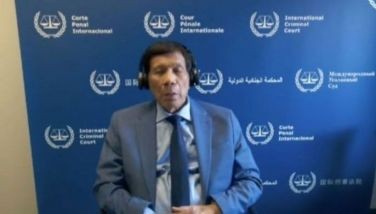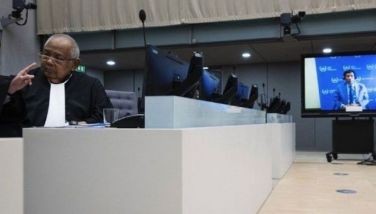When walls donÆt divide
Walls are traditionally the metaphor for division, schisms. These concrete barriers also represent inhibition and restriction, a state of not being free. Historically, the famous walls of mankind either sought to divide or protect, and either way, the existence of such structures are rooted in negative and deleterious reasons.
The Berlin Wall divided Germany and became a symbolism of the Cold War and Soviet oppression. The Great Wall of China, while built to protect a Chinese emperorÆs territory from invaders, whether Manchurian or Mongolian, also reinforced the idea that people at the time were greatly divided and were constantly at war with one another. Suffice it to say, walls, whether as actual structures or as allegories to division and limiting circumstances, are not a good thing.
But the last four years have seen a radical evolution of the wall. Facebook has made æthe WallÆ an essential tool in connecting people, in giving them their own free space, albeit virtual, where democracy and friendship can thrive.
Imagine how what has been viewed throughout history as a representation of the worst mankind has to offerùoppression, division, war, bondageùhas transformed into a force for good, a platform for communication and connection, unity and mutual understanding among friends and family, and among peoples from all continents.
Facebook has essentially torn down the wall that divides and rebuilt it into one that extends into a limitless space (of ôolder postsö) that bridges emotions, relationships, ideas, memories, and people.
Zuckerberg, seen as an obnoxious nerd in the Oscar frontrunner ôThe Social Network,ö has truly changed the modern world like no other man has. He has made the world wide web, the virtual space of the information age, as real as it gets, blurring the line between virtual and actual reality. And this is evidenced further by how many consider Facebook realities as, well, reality.
ôAre we friends on Facebook?ö ôAdd me on Facebook!ö ôThe link is posted on my Wallö ôKinsa to pasabot sa imo status?ö ôYouÆre not in Facebook anymore, did you delete your account? Did you æun-friendÆ me?ö ôDonÆt post it here, PM meö ôI ælikedÆ your status!ö ôWhy are you single in Facebook? ArenÆt we official yet? Why wonÆt you change it?ö ôSus, I blocked him on Facebook!ö ôArgh! I donÆt like the new profile!ö ôUpload them ha and tag me!öö
These are just some of the most common things we hear in this Era of Facebook, and there are more statements of such sort that show how human relations have been completely redefined (or enhanced?) by this ground-breaking social networking site, with its version of the ôWallö as a critical part of this revolution.
Sure, we still have to contend with problems with etiquette, miscommunication, privacy issuesùand other problems of abuse that our humanity almost always certainly guarantees when (too much) freedom is givenùbut all these are simply outweighed by the advantages of being connected and staying connected.
Facebook has also done wonders as a force for good, becoming an integral component in socio-political mobilization and as a platform for education and information dissemination for various advocacies.
ItÆs just amazing what itÆs become and what it has done for people in such short a time; and old or young (although kids arenÆt supposed to be on Facebook, as per their policy), European, Filipino, or African, rich or poor, we all own a Wall where we can continue to collaborate with everyone else. Its success should also encourage others to dream bigger and to continue to try to innovate, to experiment, to design for development, because one important lesson we could learn from the entire Facebook experience is that we all have something to offerùthat even an obnoxious nerd can change the world.
And plastered on our walls, connected each in this vast social network I call the Great Walls of Mankind, somewhere there, in between the status post on your recent heart ache and that old photo from high school youÆd soon be untagging, could be that bright idea, or moving words that could inspire other innovations and bright ideas that can change the world.
Now, isnÆt that fantasticùhow walls now have a different meaning and how our world is changed because of them, and how we can also change the world with our walls? Like our limitless walls, just think of the limitless possibilities and keep postingùbecause when walls donÆt divide, they can change things for the better.
Sin Ni Kway Lok! Kiong Hee Huat Tsai!
* * *
Tonight on The Bottomline with Boy Abunda: After Hubert Webb, Lauro Vizconde presents his side to a decades-long fight and search for justice, sharing his thoughts and feelings on moving on, forgiveness and revenge, and having a reason to live.
Watch it after Banana Split on ABS-CBN. Encore telecast on the ABS-CBN News Channel (ANC), Sunday, 1:00 pm.
* * *
Email: leo_lastimosa@abs-cbn.com
- Latest
- Trending






























